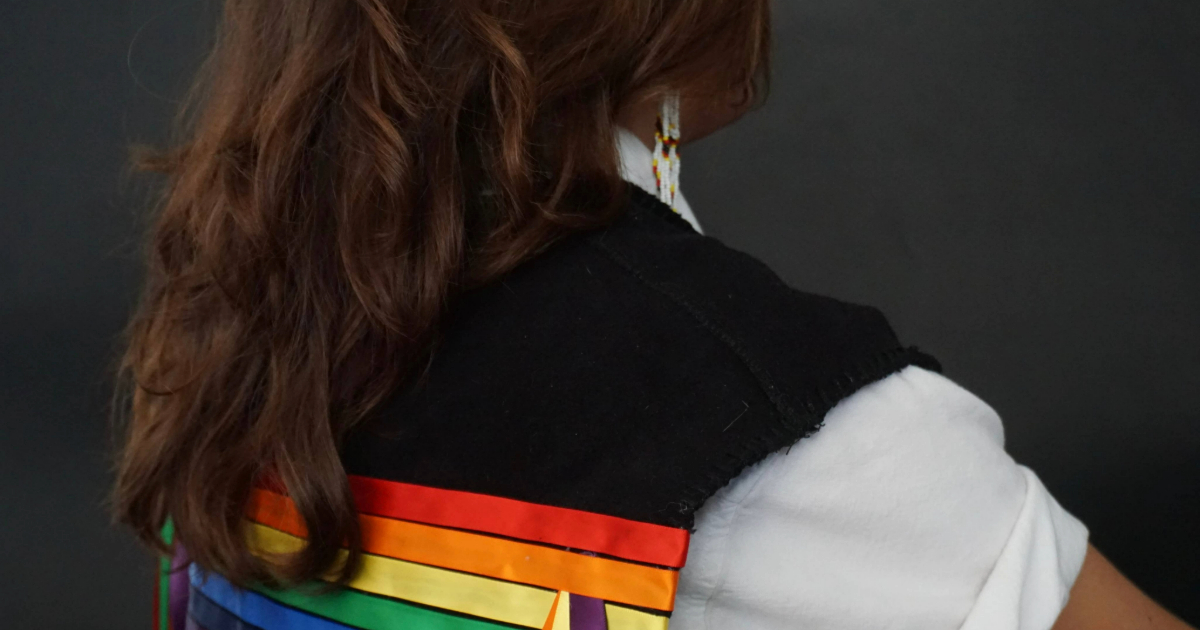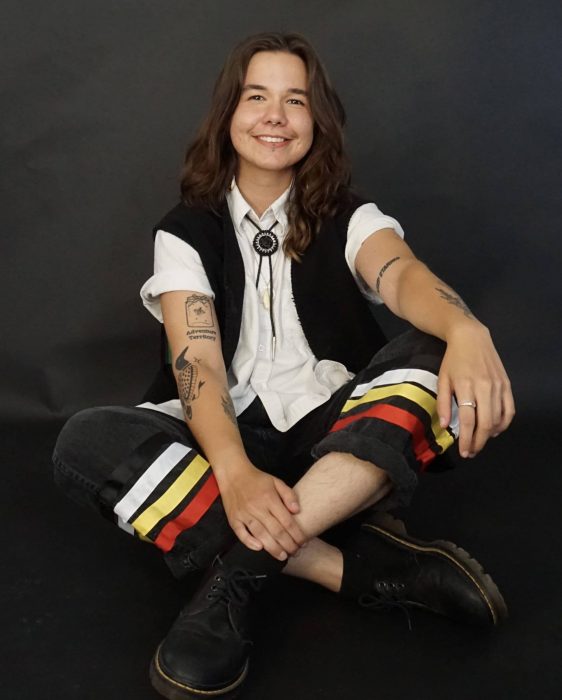
Photo by Azka Ahmed.
Representation matters
Giving hope to 2SLGBTQIA+ youth
For Sunday Queskekapow (they/them), a Two-Spirit Swampy Cree person from northern Manitoba, representation matters.
“I’m originally from Ohpáskowayáhk, also known as OCN/The Pas, and I spent a lot of my teenage years feeling confused and secluded,” says Queskekapow. “I just didn’t see a lot of people who were like me and so I didn’t really know who I was.”
In late 2020, they left their home community to pursue post-secondary education at the University of Manitoba where they are now doing their undergrad with a B.A. in Indigenous Studies.

Sunday Queskekapow (photo by Azka Ahmed, bolo tie by artist Eli Bird)
Queskekapow also works as a community and youth engagement coordinator with 2Spirit Manitoba Inc., a research advisor with Manitoba Harm Reduction, and they sit on the provincial government’s advisory circle for suicide prevention policy, overseen by the Honourable Bernadette Smith.
“It’s definitely a lot of work for one person to do,” says Queskekapow. “But this isn’t just work for me, it’s my life. It’s the life that I’ve lived and it’s the life my community members are living.”
When Queskekapow was seventeen, they made the decision to pursue gender affirming care. With no access to a general practitioner, Queskekapow says they would pack up their rusted 2003 Dodge Neon and make regular trips into Winnipeg, seven hours away from their family and their supports, to receive the care they needed. They became homeless and spent some time sleeping on the couches of friends before saving enough money to move to Winnipeg and enroll in university.
“I had to be displaced from my community to receive care that everyone should have the right to,” says Queskekapow. “And because of all these obstacles, I made a vow to make it my life’s commitment to ensure that other 2SLGBTQIA+ youth in northern and rural communities will someday have equal access to gender affirming care.”
Queskekapow says they realized they needed a post-secondary education to do the work they wanted to do and were drawn to the Indigenous Studies program at UM.
Outside of school, Queskekapow’s work focuses on aiding 2SLGBTQIA+ people in Manitoba, with a more recent focus on northern and rural Manitoba communities. As someone from northern Manitoba, Queskekapow says they bring a perspective to the table that is often overlooked.
“I’ve sat in meetings where everyone is talking about very important issues, but I’ll notice that no one has mentioned how we’re going to help people in northern and remote communities,” says Queskekeapow. “And I’ve realized how important it is to have people like me, with my similar lived experience, in these spaces and in these rooms.”
Queskekapow says their goal is to go into policy work.
“My path has just been very clear. I see the need for Two-Spirit people at the decision-making tables, helping with policy – especially at different levels of government. Whether that might be within reserves, local municipalities, provincially or federally, it’s needed at all levels.”
As they continue to work toward their goals, Queskekapow is grateful for the community they’ve found in Winnipeg, and the connections they’ve made with Two-Spirit Elders – including Elders Charlotte Nolin, Barbara Bruce, Albert McLeod and Gayle Pruden.
“Just hearing all their stories of what they’ve done and what they’ve gone through helps me to realize that I can keep going,” says Queskekapow. “They’re making sure that things don’t have to be as hard for us as they were for them and now it’s our turn to do the same for the next generation.”
For Queskekapow, having Two-Spirit and Trans representation in their life has made a huge impact and helped them to see a future for themself they never could have imagined.
“I never thought I’d be where I am right now,” says Queskekapow. “I’ll be sitting in the Manitoba Legislative building and thinking to myself ‘how many northern, Two-Spirit Trans individuals have sat here?’”
And Queskekapow says they hope the work they do will help 2SLGBTQIA+ youth see that they can grow up to be happy adults.
“I was them once. And that part of me is still in here, guiding me and driving me to do the work that I do,” says Queskekapow. “Having representation and reassurance in my teenage years would have made things a lot easier for me.”
And that’s also why Queskekapow says celebrating Pride is so crucial for the 2SLGBTQIA+ community.
“It’s to show youth that they have the community, the support and the representation. To show them that people are always fighting for them,” says Queskekapow. “Pride is so much more than a celebration. It means freedom for all and it’s about showing 2SLGBTQIA+ youth that they can grow up to become happy adults and eventually, happy Elders too.”






